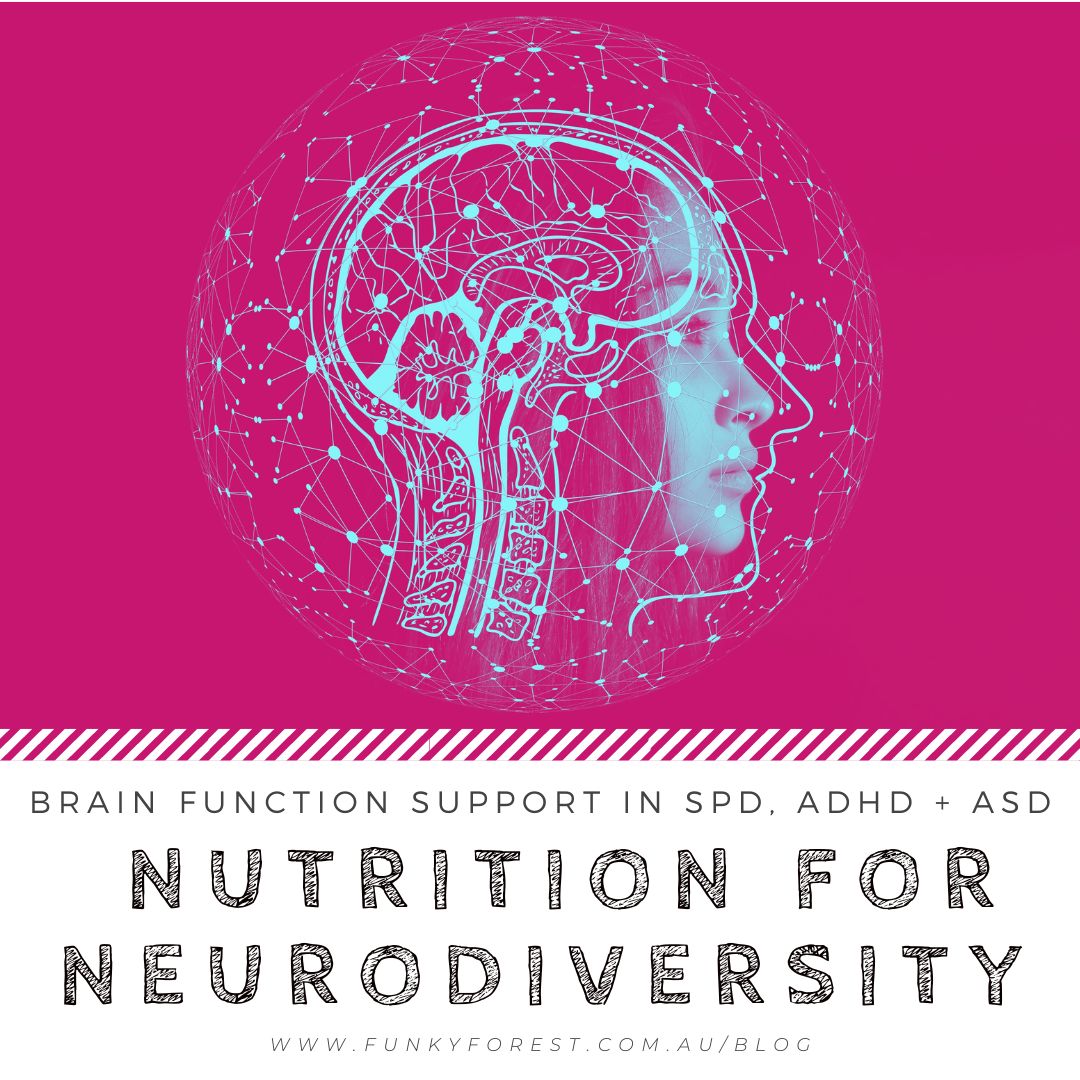Atypical patterns of sensory processing may involve a combination of incredible strengths (i.e. creativity, systematising, memory, pattern recognition, problem solving, innovative thinking, critical thinking) as well as unique sets of challenges and environmentally-induced vulnerabilities (i.e. sensory overload, trauma, anxiety, emotional intensity/lability, psychosomatic issues, impulsivity, perfectionism, executive functioning issues).
In the words of my mentor Fiona Sutherland, "Neurodiversity recognises that both brain function and behavioural traits are simply indicators of how diverse the human population is."
As a nutritionist and mother of an amazing child who has recently recognised SPD, I've found there is plenty we can do with nutrition to support kids, teens and adults on the spectrum! I'm also beginning to recognise that some of my long-standing quirks may be indicative of my own form of sensory processing divergence. This has been a sense-making journey indeed.
In this article I'll focus on:
- Some of the better known forms of neurodivergence - and some lesser known
- Why neurodivergent folks may have higher nutritional needs, and
- Nutrition interventions from a naturopathic perspective.
Types of neurodivergence
Autism spectrum disorder (ASD) is a neurodevelopmental disorder that causes disruption in communication, especially in social interactions. Symptoms include anxiety, violence, depression, self-injury, issues with social contact and pervasive, stereotyped, and repetitive behavior. ASD is most noticeable in early childhood (1).
Attention Deficit Hyperactivity Disorder (ADHD) is a lasting pattern of inattention with or without hyperactivity that makes functional disrupt in daily life. ADHD symptoms include impulsivity, hyperactivity, inattention, restlessness, talkativeness, excessive fidgeting in situations such as sitting, meetings, lectures, or at the movies, boredom, inability to make decisions, and procrastination (1).
Sensory processing disorder (SPD) is a neurological condition that is characterised by disorganised sensory processing and it may lead to hyper- or hyposensitivity to pain, temperature, sound, and touch, among other issues (2).
Sensory processing disorder is more common in children with autism, ADHD and other genetic conditions and in children who were born prematurely, but it can also be a stand-alone condition.
Children with sensory issues typically have higher nutritional needs because they often experience oral defensiveness as well as abnormal sensitivity to textures, taste, and smells that limit their food intake, such as in picky eating (3).
Nutrients to support neurological function
In general, with folks experiencing sensory processing issues I aim to support the brain and nervous system. More specifically, I aim to:
- Support cognitive function
- Calm the mind and soothe the nerves
- Maintain and support nervous system health
- Relieve nervous tension, unrest and irritability
- Reduce and relieve the symptoms of mild anxiety and other symptoms according to the individual and how their diagnosis manifests for them e.g. reduce hyperactivity and/or impulsivity and oppositionality symptoms in ADHD, or reduce carbohydrate cravings, spinning behaviour, and energy crashes in kids with SPD (hyposensitive-type).
Some specific nutrients to consider:
- Magnesium - for a healthy stress response. Folks with sensory processing disorder experience a stress response on a more frequent and intense basis and likely need more magnesium. Kids with ADHD or ASD often have low magnesium levels. Supplementation with magnesium and vitamin D has been shown to improve ADHD symptoms when baseline levels of vitamin D are deficient (4).
- Essential fatty acids (EFAs) - The most crucial omega-3 fatty acid for the brain, DHA, is highly accumulated in nervous tissue membranes and is important for neural function. Deficiencies of omega-3 EFAs have been associated with ADHD, and supplementation shows promising results. A higher ratio of EPA to DHA (e.g., 2:1 ratio) or EPAs alone should be considered for omega-3 supplementation in ADHD (5).
- Vitamins B6, B12 and Biotin - deficiencies of B vitamins have been found in children with a range of neurodivergent diagnoses.
- Vitamin B6 is essential for the synthesis of all the neurotransmitters (chemicals which help to transmit messages in the CNS) Historically, magnesium + vitamin B6 supplementation has been used in ADHD and ASD with reports of a decrease in hyperactivity and a stabilisation of scholarly behaviour with treatment, although more controlled research is required (6).
- Vitamin B12 is essential for the maintenance of myelin (a component of the CNS) and inadequate synthesis of myelin leads to neurological damage. Low levels were correlated with increased hyperactivity and/or impulsivity and oppositionality symptoms among children with ASD (7).
- Biotin plays a critical role in carbohydrate metabolism and fatty acid synthesis. Deficiency can show up in kids with SPD as carbohydrate cravings, spinning behaviour, and energy crashes (3).
- Vitamin E - enhances the health of nerve cells and brain, as do B vitamins & omega-3 fatty acids.
- Zinc - a modulator of synaptic activity, neuronal plasticity and healthy brain function. It's also needed for proper digestive function, and kids with SPD and ASD often have poor gut function (8,9). Low levels of zinc are associated with ASD, and the Zinc/Copper ratio can be a biomarker of ASD (10).
- Adequate carbohydrate - Children with ASD consume fewer fruits and vegetables compared to their typically developing peers (11). This may be due to increased selectivity in eating, with preference given to high GI carbohydrate foods such as white bread, pizza, cakes, cookies, or ice-cream. However, ample amounts of low GI carbohydrates, fruits and vegetables provide nutritious carbohydrates that are a steady source of energy. This targets attention issues and brain fog that some kids with SPD struggle with.
On the "eating vegetables" note, if there are even one or two vegetables that your neurodivergent child enjoys, I suggest jumping on that train and offering these frequently whilst patiently re-exposing other vegetables over time... without the expectation that the child will eat them! For my neurodivergent son, all fruit are out and carrots and red capsicums are the only vegetables he will eat, so guess what - we eat a lot of carrots and red capsicums!
Having a brain that works differently doesn't mean that folks with these differences are less-than or defective, even though the world gives that message a lot of the time. The world would be missing a lot of innovation and creativity without these different types of brains!
Always consult a qualified dietitian, nutritionist or naturopath who will use pathology results and other assessments to prescribe you or your loved one the right combination and dose of nutrients for your needs. As an accredited practising dietitian and holistic nutritionist I would love to help you or your loved one with neurodivergent needs in any way I can. If you want more information or to book an appointment with me, you can find me at [email protected].
Thanks for reading!
Casey
References
- Poudineh, M., Parvin, S., Omidali, M., Nikzad, F., Mohammadyari, F., Sadeghi Poor Ranjbar, F., Rasouli, F., Nanbakhsh, S., & Olangian-Tehrani, S. (2022). The Effects of Vitamin Therapy on ASD and ADHD: A Narrative review. CNS & neurological disorders drug targets, 10.2174/1871527321666220517205813. Advance online publication. https://doi.org/10.2174/1871527321666220517205813
- Delgado-Lobete, L., Pértega-Díaz, S., Santos-Del-Riego, S., & Montes-Montes, R. (2020). Sensory processing patterns in developmental coordination disorder, attention deficit hyperactivity disorder and typical development. Research in developmental disabilities, 100, 103608. https://doi.org/10.1016/j.ridd.2020.103608
- Clayton, G., Carrera, H. A., Martin, E. R., Morrison, D., & Bawazir, A. A. (2018). A Biomedical Approach Via Telemedicine in the Treatment of a Child With Sensory Processing Disorder Using Diet and High-dose Biotin Intervention: A Case Report. Integrative medicine (Encinitas, Calif.), 17(4), 52–58. https://pubmed.ncbi.nlm.nih.gov/31043911/
- Pinto, S., Correia-de-Sá, T., Sampaio-Maia, B., Vasconcelos, C., Moreira, P., & Ferreira-Gomes, J. (2022). Eating Patterns and Dietary Interventions in ADHD: A Narrative Review. Nutrients, 14(20), 4332. https://doi.org/10.3390/nu14204332
- Pei-Chen Chang J. (2021). Personalised medicine in child and Adolescent Psychiatry: Focus on omega-3 polyunsaturated fatty acids and ADHD. Brain, behavior, & immunity - health, 16, 100310. https://doi.org/10.1016/j.bbih.2021.100310
- Mousain-Bosc, M., Siatka, C., & Bali, J. P. (2011). Magnesium, hyperactivity and autism in children. In R. Vink (Eds.) et. al., Magnesium in the Central Nervous System. University of Adelaide Press.
- Jennings, L., & Basiri, R. (2022). Amino Acids, B Vitamins, and Choline May Independently and Collaboratively Influence the Incidence and Core Symptoms of Autism Spectrum Disorder. Nutrients, 14(14), 2896. https://doi.org/10.3390/nu14142896
- Schaaf, R. C., Benevides, T., Blanche, E. I., Brett-Green, B. A., Burke, J. P., Cohn, E. S., Koomar, J., Lane, S. J., Miller, L. J., May-Benson, T. A., Parham, D., Reynolds, S., & Schoen, S. A. (2010). Parasympathetic functions in children with sensory processing disorder. Frontiers in integrative neuroscience, 4,4. https://doi.org/10.3389/fnint.2010.00004
- Mazurek, M. O., Vasa, R. A., Kalb, L. G., Kanne, S. M., Rosenberg, D., Keefer, A., Murray, D. S., Freedman, B., & Lowery, L. A. (2013). Anxiety, sensory over-responsivity, and gastrointestinal problems in children with autism spectrum disorders. Journal of abnormal child psychology, 41(1), 165–176. https://doi.org/10.1007/s10802-012-9668-x
- Li, S. O., Wang, J. L., Bjørklund, G., Zhao, W. N., & Yin, C. H. (2014). Serum copper and zinc levels in individuals with autism spectrum disorders. Neuroreport, 25(15), 1216–1220. https://doi.org/10.1097/WNR.0000000000000251
- Narzisi, A., Masi, G., & Grossi, E. (2021). Nutrition and Autism Spectrum Disorder: Between False Myths and Real Research-Based Opportunities. Nutrients, 13(6), 2068. https://doi.org/10.3390/nu13062068



































 RSS Feed
RSS Feed



